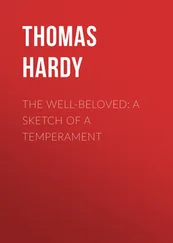Beside her, in case she might require more light, a brass candlestick stood on a little round table, curiously formed of an old coffin-stool, with a deal top nailed on, the white surface of the latter contrasting oddly with the black carved oak of the substructure. The social position of the household in the past was almost as definitively shown by the presence of this article as that of an esquire or nobleman by his old helmets or shields. It had been customary for every well-to-do villager, whose tenure was by copy of court-roll, or in any way more permanent than that of the mere cotter, to keep a pair of these stools for the use of his own dead; but for the last generation or two a feeling of cui bono had led to the discontinuance of the custom, and the stools were frequently made use of in the manner described.
The young woman laid down the bill-hook for a moment and examined the palm of her right hand, which, unlike the other, was ungloved, and showed little hardness or roughness about it. The palm was red and blistering, as if this present occupation were not frequent enough with her to subdue it to what it worked in. As with so many right hands born to manual labor, there was nothing in its fundamental shape to bear out the physiological conventionalism that gradations of birth, gentle or mean, show themselves primarily in the form of this member. Nothing but a cast of the die of destiny had decided that the girl should handle the tool; and the fingers which clasped the heavy ash haft might have skilfully guided the pencil or swept the string, had they only been set to do it in good time.
Her face had the usual fulness of expression which is developed by a life of solitude. Where the eyes of a multitude beat like waves upon a countenance they seem to wear away its individuality; but in the still water of privacy every tentacle of feeling and sentiment shoots out in visible luxuriance, to be interpreted as readily as a child’s look by an intruder. In years she was no more than nineteen or twenty, but the necessity of taking thought at a too early period of life had forced the provisional curves of her childhood’s face to a premature finality. Thus she had but little pretension to beauty, save in one prominent particular—her hair. Its abundance made it almost unmanageable; its color was, roughly speaking, and as seen here by firelight, brown, but careful notice, or an observation by day, would have revealed that its true shade was a rare and beautiful approximation to chestnut.
On this one bright gift of Time to the particular victim of his now before us the new-comer’s eyes were fixed; meanwhile the fingers of his right hand mechanically played over something sticking up from his waistcoat-pocket—the bows of a pair of scissors, whose polish made them feebly responsive to the light within. In her present beholder’s mind the scene formed by the girlish spar-maker composed itself into a post-Raffaelite picture of extremest quality, wherein the girl’s hair alone, as the focus of observation, was depicted with intensity and distinctness, and her face, shoulders, hands, and figure in general, being a blurred mass of unimportant detail lost in haze and obscurity.
He hesitated no longer, but tapped at the door and entered. The young woman turned at the crunch of his boots on the sanded floor, and exclaiming, “Oh, Mr. Percombe, how you frightened me!” quite lost her color for a moment.
He replied, “You should shut your door—then you’d hear folk open it.”
“I can’t,” she said; “the chimney smokes so. Mr. Percombe, you look as unnatural out of your shop as a canary in a thorn-hedge. Surely you have not come out here on my account—for—”
“Yes—to have your answer about this.” He touched her head with his cane, and she winced. “Do you agree?” he continued. “It is necessary that I should know at once, as the lady is soon going away, and it takes time to make up.”
“Don’t press me—it worries me. I was in hopes you had thought no more of it. I can not part with it—so there!”
“Now, look here, Marty,” said the barber, sitting down on the coffin-stool table. “How much do you get for making these spars?”
“Hush—father’s up-stairs awake, and he don’t know that I am doing his work.”
“Well, now tell me,” said the man, more softly. “How much do you get?”
“Eighteenpence a thousand,” she said, reluctantly.
“Who are you making them for?”
“Mr. Melbury, the timber-dealer, just below here.”
“And how many can you make in a day?”
“In a day and half the night, three bundles—that’s a thousand and a half.”
“Two and threepence.” The barber paused. “Well, look here,” he continued, with the remains of a calculation in his tone, which calculation had been the reduction to figures of the probable monetary magnetism necessary to overpower the resistant force of her present purse and the woman’s love of comeliness, “here’s a sovereign—a gold sovereign, almost new.” He held it out between his finger and thumb. “That’s as much as you’d earn in a week and a half at that rough man’s work, and it’s yours for just letting me snip off what you’ve got too much of.”
The girl’s bosom moved a very little. “Why can’t the lady send to some other girl who don’t value her hair—not to me?” she exclaimed.
“Why, simpleton, because yours is the exact shade of her own, and ’tis a shade you can’t match by dyeing. But you are not going to refuse me now I’ve come all the way from Sherton o’ purpose?”
“I say I won’t sell it—to you or anybody.”
“Now listen,” and he drew up a little closer beside her. “The lady is very rich, and won’t be particular to a few shillings; so I will advance to this on my own responsibility—I’ll make the one sovereign two, rather than go back empty-handed.”
“No, no, no!” she cried, beginning to be much agitated. “You are a-tempting me, Mr. Percombe. You go on like the Devil to Dr. Faustus in the penny book. But I don’t want your money, and won’t agree. Why did you come? I said when you got me into your shop and urged me so much, that I didn’t mean to sell my hair!” The speaker was hot and stern.
“Marty, now hearken. The lady that wants it wants it badly. And, between you and me, you’d better let her have it. ’Twill be bad for you if you don’t.”
“Bad for me? Who is she, then?”
The barber held his tongue, and the girl repeated the question.
“I am not at liberty to tell you. And as she is going abroad soon it makes no difference who she is at all.”
“She wants it to go abroad wi’?”
Percombe assented by a nod. The girl regarded him reflectively. “Barber Percombe,” she said, “I know who ’tis. ’Tis she at the House—Mrs. Charmond!”
“That’s my secret. However, if you agree to let me have it, I’ll tell you in confidence.”
“I’ll certainly not let you have it unless you tell me the truth. It is Mrs. Charmond.”
The barber dropped his voice. “Well—it is. You sat in front of her in church the other day, and she noticed how exactly your hair matched her own. Ever since then she’s been hankering for it, and at last decided to get it. As she won’t wear it till she goes off abroad, she knows nobody will recognize the change. I’m commissioned to get it for her, and then it is to be made up. I shouldn’t have vamped all these miles for any less important employer. Now, mind—’tis as much as my business with her is worth if it should be known that I’ve let out her name; but honor between us two, Marty, and you’ll say nothing that would injure me?”
“I don’t wish to tell upon her,” said Marty, coolly. “But my hair is my own, and I’m going to keep it.”
Читать дальше












